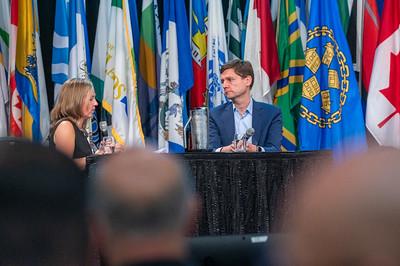The provincial government has introduced legislation to regulate the use of illicit drugs in public areas. The legislation responds to concerns raised by BC local governments at the 2023 UBCM convention and throughout the decriminalization pilot from its inception.
With the new provincial legislation, a person may not consume illegal substances:
- Within 15 metres of a play structure in a playground, spray pool or wading pool, or skate park
- Within 6 metres from building entrances, including businesses and residential buildings;
- Within 6 metres of a bus stop; and
- At parks, beaches and sports fields.
Police will have the authority to ask the person to leave the area and/or cease the activity; and can seize or destroy illegal substances.
Local governments are required to consult with their medical health officer and regional health authority before considering bylaws to regulate, prohibit or impose requirements about the consumption of illegal substances in public.
The provincial legislation builds on changes that were made to the Health Canada exemption on September 18, which added play structures, spray pools, wading pools and skate parks to the list of areas where the possession of illegal substances is banned.
At the 2023 UBCM Convention, BC local governments considered and endorsed three resolutions related to decriminalization. Resolution SR4 asked the provincial government to further regulate the possession and use of illicit drugs in parks, beaches, sports fields and bus stops where children also gather. Resolution NR7 requested an amendment to the Tobacco and Vapour Products Control Act to enable supervised consumption and other harm reduction facilities to allow inhalation. The third resolution, 2023-SR3, asked the provincial government to provide financial investments to ensure the provision of geographically accessible, on-demand mental health and addiction treatment, detox and recovery services; overdose prevention sites with inhalation; and access to safe supply and drug testing for all regions of BC.
Data Dashboard
In September 2023, the provincial government released a data snapshot which, in part, includes information about the impacts of decriminalization, including law enforcement data, and connecting people to services. The Ministry of Mental Health and Addictions has indicated that the snapshot will be updated more than once a year.
Law enforcement training
As partners on decriminalization, local governments are invited to participate in the law enforcement training, A Health-Based Approach to Drug Possession in BC. This is the second phase of police and bylaw training and will focus on concepts related to substance use and harms associated with the criminalization of personal use of illegal drugs. It will also discuss the use of trauma-informed policing in reducing stigmas associated with drug use. The course is 1.5-2 hours in length and is available at no cost. To register:
1. Email decrim@gov.bc.ca identifying your agency and how many employees will be enrolling.
2. Ministry staff will email CPKN approving your request.
3. You will be responsible for filling out a group registration form, provided to you by CPKN. Submit the registration form back to the support desk.
4. Wait for login credentials via CPKN. Check your junk mail folder if not received after 72 hours.
5. Log on to CPKN and complete the training.

